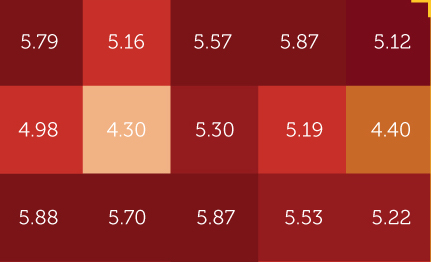
Unification Transparency Index: Allied Views of China and Japan
Beyond Parallel surveys are seeking to quantify how much the United States, South Korea, China, Japan, and Russia actually know about the long-term issues associated with Korean unification. And similarly, how strongly do countries in the region perceive such issues to be important to their own national interests?
Beyond Parallel surveys of U.S. and South Korean experts found that there is general overlap in the allied views that domestic stabilization in the North constitutes a large blind spot for Beijing and Tokyo. This implies that all four countries would agree that law and order, peace, and stability are key areas of work for all four parties. (Chinese and Japanese surveys are forthcoming.)
For China, both U.S. and South Korean experts assume the issues of domestic stabilization and refugees are the biggest blind spots. South Korea estimates that for China the largest blind spot with unification is refugees followed by domestic stabilization, placing both more than one standard deviation above its average blind spot score. (For more on analysis on the issue of Refugees & Migration, see Refugees, Internal Displacement, and the Future of the Korean Peninsula.) Health and environment ranked a distant third and fourth. These issues would all likely have the most direct impact on China in a unification scenario. Ironically, South Korea assigns more consistency to Chinese views than their own in that all four of China’s top priorities are arguably interrelated disaster risk reduction (DRR) issues, the handling of which could impact the severity of the refugee problem. In South Korea’s case, they rank domestic stabilization highly, but put specific DRR issues as lower priority.
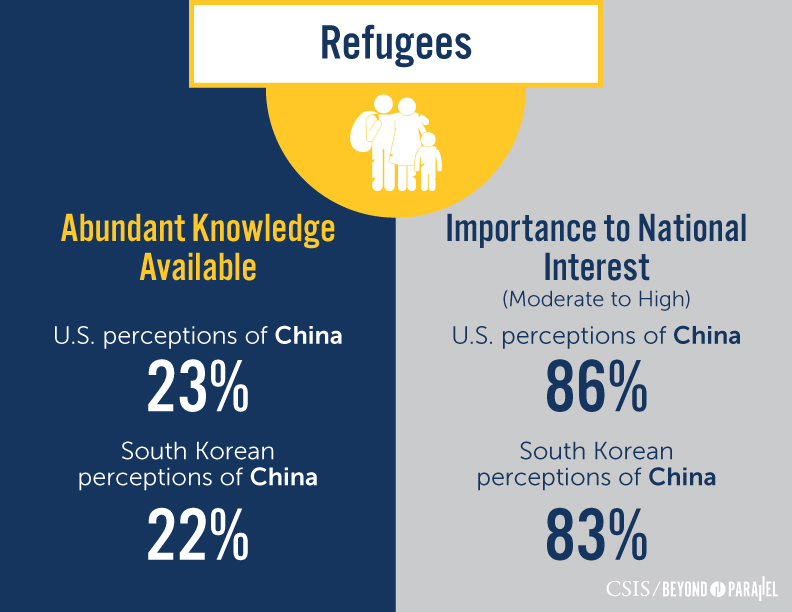
In contrast, South Korea sees nuclear weapons as one of the lowest level blind spots for China in unification, rating it a full standard deviation below its average blind spot score. This is driven by the fact that 90 percent of ROK experts assume China has at least a sufficient amount of knowledge on nuclear weapons, while just 47 percent of ROK experts assume China sees nuclear weapons in a unification scenario as vital to China’s national interests. This is not the case for U.S. perceptions, which rank this blind spot for China as its fourth largest and just 0.02 points below its average blind spot score.
South Korea sees an alignment of priorities among Washington, Beijing, and Seoul because all regard domestic stabilization as a prominent unification blind spot that could provide a good platform for Four-Party coordination. All three countries are perceived to regard the issue as relatively vital to their national interests but have relatively lower levels of available knowledge.
For Japan, both U.S. and South Korean experts assume the issues of nuclear weapons and domestic stabilization are the biggest blind spots. South Korean respondents in fact, assessed that Japan is the only country whose most prominent blind spot is the disposition of the North’s nuclear weapons, rating it greater than one standard deviation above its average blind spot score.
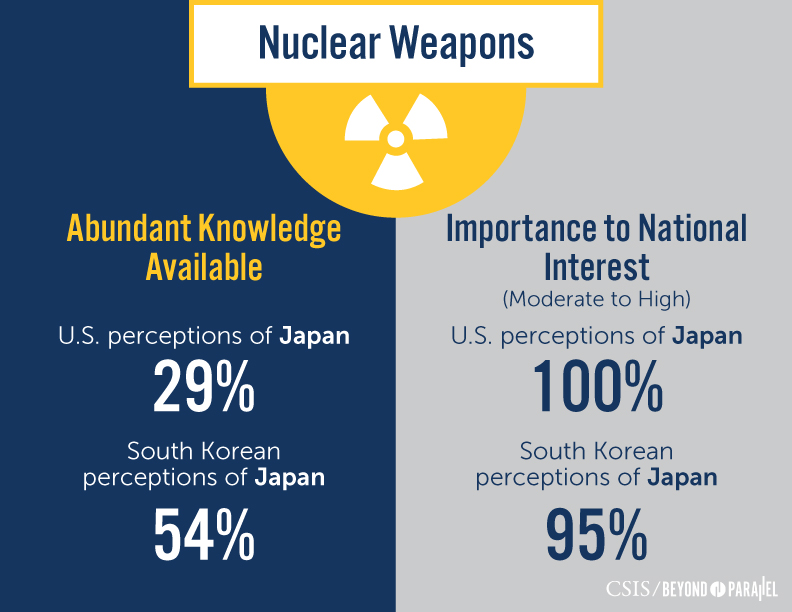
Unification Issues’ Importance to China and Japan National Interests
Overall, South Korean experts assume China has a much lower level of concern across all unification related topics than South Korea does; 41 percent of South Korean experts perceive China’s overall level of concern was low, while 49 percent said South Korea’s overall level of concern was high. In contrast, U.S. experts assume China’s levels of concern across all unification topics is relatively similar to their own levels.
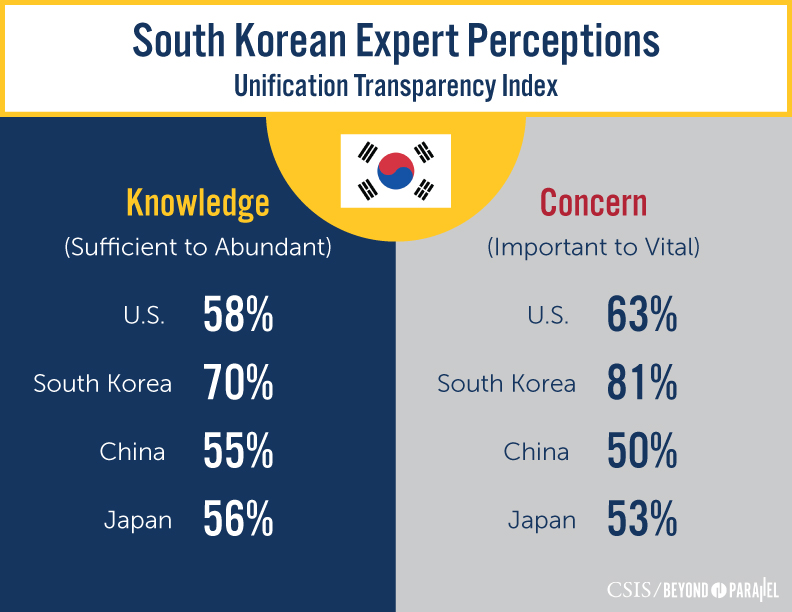
U.S. and South Korean experts share the same assumptions on the order of issues of concern for China. The top three most vital to China’s national interests, as defined by U.S. and South Korean experts, are domestic stabilization, nuclear weapons, and refugees.
Overall, U.S. and South Korean experts agree on Japan’s level of concern across all the unification topics in the survey. In both groups, 39 percent of the experts perceived Japan’s overall level of concern was low.
On Japan, U.S. and South Korean experts share a similar assumption that the top two issues of concern for Japan are nuclear weapons and conventional forces. But they disagree on Japan’s level of concern on the issue of refugees. Only 8 percent of U.S. experts thought the issue of refugees was vital to Japan’s national interest, while 20 percent of South Korean experts thought it would be vital. This suggests that South Korea might better understand Japanese concerns about refugees in a unification scenario involving Chosen Soren communities in Japan than the United States does.
Availability of Unification Empirical Evidence in China and Japan
Overall, U.S. experts assume that China has more knowledge available across all unification topics than they assume for either themselves or Japan; 61 percent said China had sufficient to abundant knowledge, while 46 percent said the same of both the United States and Japan. Overall, ROK experts assume they have more knowledge available to them across all unification topics than they assumed China and Japan had; 70 percent said the ROK had sufficient to abundant knowledge, while 55 percent said the same of China and 56 percent said the same of Japan.
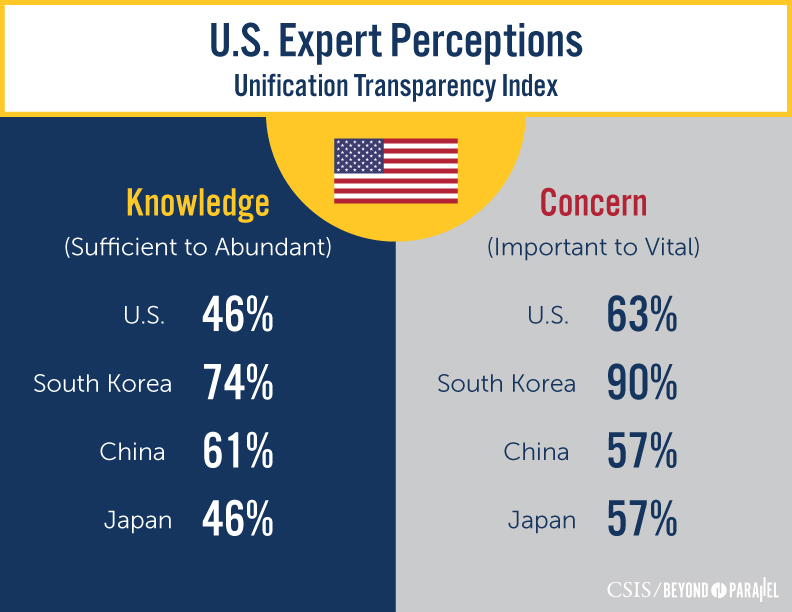
On China, U.S. experts assume China lacks knowledge on the issues of human rights/transitional justice, health, environment, and cost. South Korean experts agree these are the four top issues where China lacks knowledge. At the other end of the spectrum, 90 percent of South Korean experts believe China has at least sufficient knowledge of nuclear weapons, awarding it the highest knowledge score of all topics. 89 percent of American respondents said the same.
On Japan, U.S. experts assume Japan has relatively less knowledge on the issues of health, environment, infrastructure, and costs than it does on other topics. South Korean experts also agree that health, environment, and costs are issues where Japan lacks knowledge.
How to Understand the Index?
In the Unification Transparency Index, blind spots are a composite measure based on two variables from the Beyond Parallel pilot survey of experts and policymakers. The first variable assessed is the relative level of importance for a unification-related topic to the national interests of the United States, Japan, South Korea, China, and Russia as it relates to the Korean peninsula. The highest levels were scored a 4 (vital to national interests). Responses that indicated an issue was “of importance, but not vital” to national interests scored a 3, “of low importance” scored a 2, and the lowest levels scored a 1 (no bearing at all). The second variable assessed the amount of knowledge, which is defined as empirical evidence, analysis, and scholarly literature each country has on the issues on which to base their policy decisions. Here the highest levels of knowledge were scored a 1 (abundant empirical evidence). Responses that indicated there was a “sufficient amount” of empirical evidence scored a 2, “insufficient amount” scored a 3, and the lowest levels of knowledge were scored a 4 (no empirical evidence).
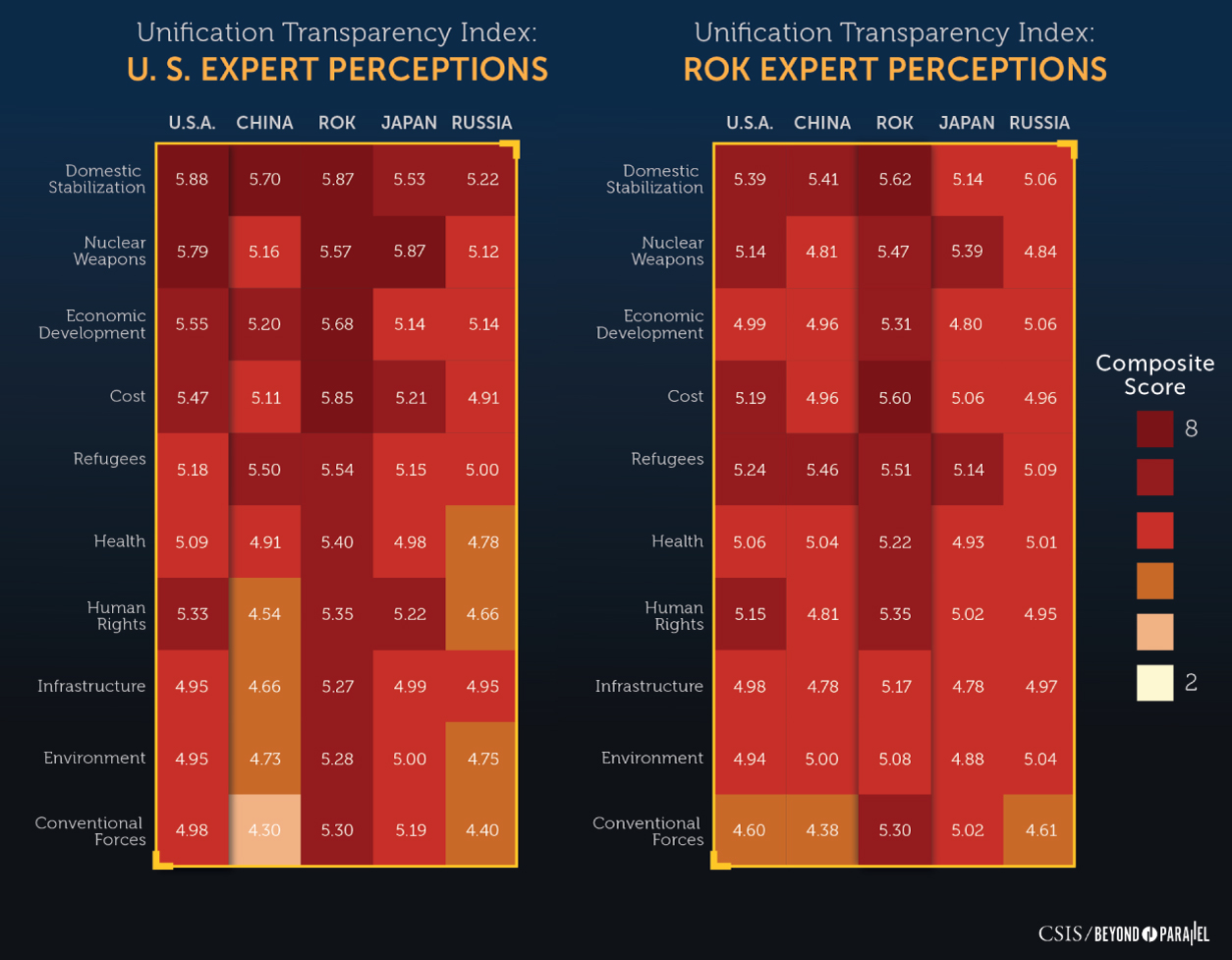
The results from these two variables were averaged and then combined to produce a composite measure of blind spots for each country on the 10 selected unification issues. The higher the score, the deeper the shade of red in the Index, and the larger the blind spot is for that issue.
The largest blind spots are at the nexus of a complete lack of empirical evidence and yet are seen as vital to national interests.
The unification issues with the largest blind spots are those at the nexus of a complete lack of empirical evidence (4) and vital to national interests (4)—a recipe for potential disaster. On the other end of the spectrum, the smallest blind spots result from issues with no bearing on national interests (1) but with abundant empirical evidence (1). The initial findings from the Index will help set the research agenda as Beyond Parallel seeks to build greater knowledge and increase available empirical evidence in each of these critical issues.
This unique Beyond Parallel data set will eventually be expanded to include—in addition to U.S. and South Korean expert perceptions—survey results of experts, officials, scholars, and opinion leaders from all five countries in the Index to offer a comprehensive assessment of what we do and do not know about unification. 
